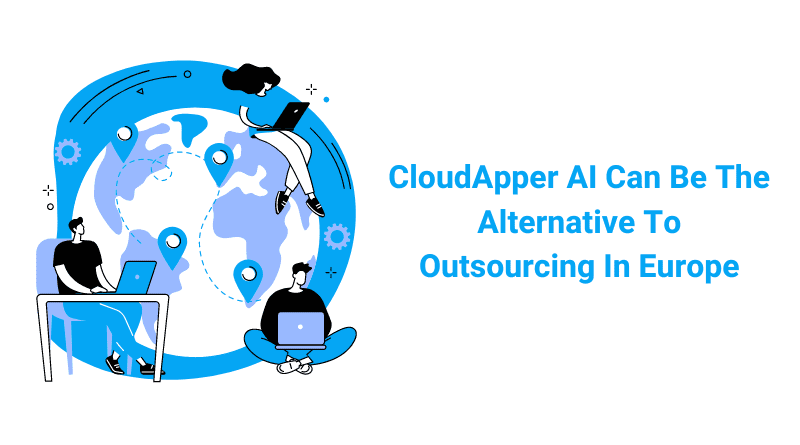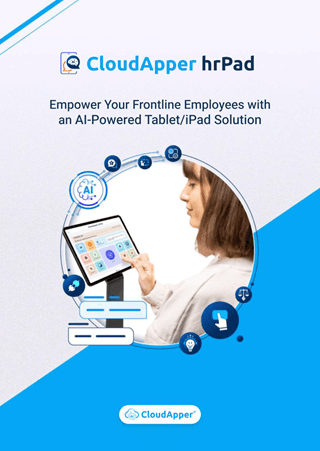It’s no secret that the IT industry, like many others, relies heavily on outsourcing. It’s the practice of bringing in outside help to carry out an organization’s needs. Because it allows them to cut expenses, boost productivity, and gain access to expertise that might not be available in-house, outsourcing has become increasingly common among organizations. For these reasons, as well as its cost-effectiveness, Europe has become a major outsourcing center. Yet, there are drawbacks to outsourcing in Europe that companies should be aware of.
Disadvantages of Outsourcing in Europe
Several companies have found that outsourcing their operations has helped them save money, work more efficiently, and get access to niche expertise. It does, however, come with a few negative points too, and the negative sides sometimes outweigh the positive ones.
Software development is an ongoing process. CloudApper AI’s DevOps support guarantees smooth maintenance, upgrades, and cloud integration for your software solution.
Cultural and Language Barriers
The cultural and linguistic gap is a major problem when it comes to outsourcing in Europe. European countries’ linguistic and cultural diversity makes it difficult to coordinate and work together. This can cause confusion, setbacks, and ultimately the project’s demise. Businesses can lessen their exposure to this threat by funding cross-cultural training, linguistic translation, and open lines of communication.
Legal Framework
The legal and regulatory environment in Europe is another barrier to outsourcing there. When it comes to labor, taxes, and IP rights, each European country has its own set of rules and regulations. Businesses are in charge of ensuring that the outsourcing contracts they enter into adhere to the legal requirements of the nations in which they conduct business. The corporation risks legal trouble, fines, and reputational damage if this doesn’t happen.
Lower quality
Another possible issue with European outsourcing is the quality of the work. The quality of work can vary widely from outsourcing partner to partner in Europe, despite Europe’s highly trained population. Companies should do their homework to make sure their outsourcing partner has the skills, experience, and quality assurance to satisfy their needs. This entails confirming the outsourcing partner’s credentials by examining references and completing background checks.
Time difference
The time difference is an additional challenge when dealing with European outsourcing. Time zone differences in Europe might make it difficult to connect instantly and coordinate schedules. This can lead to misunderstandings, slower project completion, and lower overall quality. Businesses can reduce this risk by implementing measures such as standardized work hours, response time targets, and real-time communication tools.
Security Risk
There is a potential for outsourcing in Europe to compromise a company’s safety measures. Many European countries have varying legislation and standards for cybersecurity, which might make it difficult to keep private data safe. Data encryption, secure file sharing, and routine security audits are just a few examples of how businesses should develop clear security policies. They should also check that the outsourcing partner has a solid security infrastructure in place and is adhering to industry standards for data privacy and security.
Outsourcing software development doesn’t have to be hindered by a lack of skilled developers. CloudApper’s AI platform takes the lead in software generation, ensuring reliable outcomes and optimizing resource allocation.
One of the major challenges in outsourcing is the global shortage of skilled software developers. To reduce these risks, businesses need to do their research, set up clear communication channels, set expectations for quality and security, and use technology to help people work together in real-time.CloudApper AI can be one potential solution for outsourcing in Europe’s dilemma.
 CloudApper AI Can Be The Alternative To Outsourcing In Europe
CloudApper AI Can Be The Alternative To Outsourcing In Europe
With the help of CloudApper AI, companies no longer need to outsource software development to Europe or elsewhere. CloudApper’s AI allows businesses to automate software development by drawing on the capabilities of AI. With CloudApper AI, organizations won’t have to rely on third-party developers, cutting down on their reliance on outsourcing. Instead, businesses can use CloudApper AI’s automated approach to develop tailored software to their precise specifications. This can save costs and boost productivity while enhancing software for businesses.
CloudApper AI gives companies more say in the software development process than traditional outsourcing does. Outsourcing has the potential for miscommunication and delays due to language and cultural limitations. The legal and financial risks typically associated with outsourcing can be sidestepped using CloudApper AI. Companies may face complex legal and regulatory hurdles when outsourcing to Europe or other locations. Taxes, customs, and travel charges are just some of the hidden expenses that can build up when outsourcing a project. By using CloudApper AI, businesses may expedite and reduce the cost of their software development process while avoiding common errors.
To sum up, CloudApper AI is a good option for European organizations that want to automate their software development process without giving up too much control or too much money compared to traditional outsourcing. Advanced artificial intelligence (AI) and machine learning features in CloudApper AI make it easy for businesses to make their own online and mobile apps that are enterprise-grade. CloudApper AI allows organizations to concentrate on what they do best while leaving the difficulties of software development and outsourcing to experts.


















